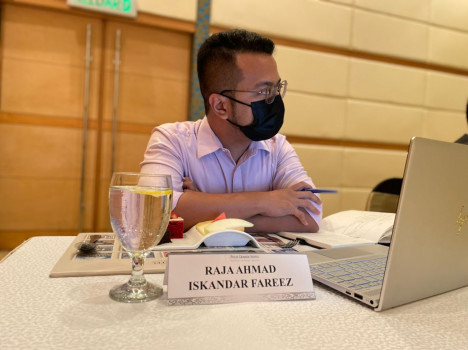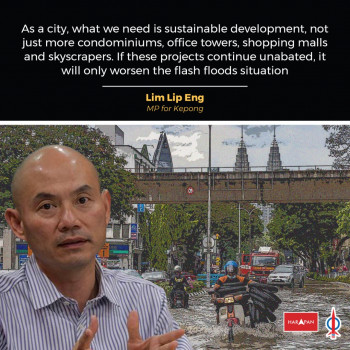By Lim Kit Siang, MP for Gelang Patah
The government’s denial syndrome in both the MH370 disaster and ESSCOM crisis are the biggest stumbling blocks in efforts to restore national and international confidence in the security and good governance in Malaysia.
The Malaysiakini interview by the former Sabah Police Commissioner from 2002 to 2004, Ramli Yusuff describing the Eastern Sabah Security Command (ESSCOM) as “ridiculous” because of the duplication of the chain of command in ESSZONE is serious food for thought and basis for immediate decision by the Cabinet.
The ESSCOM director-general Datuk Mohamad Mentek’s boast during the first anniversary celebrations of ESSCOM on April 1 about the ESSCOM’s twin successes in combining the role of the four components in Eastern Sabah Security Zone (ESSZONE) – Malaysian Armed Forces (ATM), Royal Malaysian Police (PDRM), Malaysian Maritime Enforcement Agency (APMM) and public agencies – and to stop abductions of foreign tourists have proved to be most premature following another abduction in five months and less than 24 hours of the ESSCOM’s first anniversary celebrations.
Recounting from his experiences as Sabah Police Commissioner about a decade ago, Ramli advocates that ESSCOM should be headed by the state police chief to avoid duplication of the chain of command and to ensure a better grip on security operational matters.
Ramli said it is ridiculous to have ESSCOM which creates a conflicting chain of command, and wants ESSCOM to be headed by the police or army, but he prefers the police because this is an internal security matter.
As ex-Sabah police commissioner, Ramli thinks that Mohamad Mentek is not suitable to be the ESSCOM director-general as he is from the Immigration Department and “doesn’t know operational matters”.
Ramli’s comment on the recent kidnapping of two women from a resort off Semporna warrants serious attention.
Ramli said if the police were in charge, no time would have been wasted and “no ‘pushing (bertolak-tolak)’ between ESSCOM and the police to figure out whose jurisdiction the kidnap fell under”.
Ramli said when he was police chief, there were no incursions or kidnappings because coordination was tight among all enforcement agencies, including the army.
As police chief, Ramli said, he would advise the chief minister on security issues and coordinate everything with the navy, air force, army, volunteer corps (Rela), and Immigration and Customs departments.
Ramli said the army and police shared their assets throughout Sabah, and compared notes on intelligence which he insisted is the most crucial aspect of security operations.
Special attention was also given to tourist areas where more personnel were deployed at outposts and for patrols.
Ramli said “It doesn’t matter (how long the border is). If it happens in your district you have to know”, adding that ground intelligence should be water tight in “red zones”.
Based on his experience, Ramli said “there is no way” such kidnappings and incursions can take place because the state and security personnel have already identified these “red zones”.
Malaysiakini quoted Ramli as saying:
“So I cannot understand why Esscom cannot (handle) this… These are the areas we used to take care of before and we beefed up (security) in all these areas.
“If only the police and army can sit down and work together again, it will be very good. We worked based on information on the ground.
“Now I believe they have many platoons… There is no reason for such things to happen.”
The government’s denial syndrome on the Eastern Sabah security problem is its refusal to end the overlapping and duplication of command in ESSZONE despite the creation of ESSCOM and the expenditure of over RM300 million.
The statement by the Acting Transport Minister Datuk Seri Hishammuddin Hussein yesterday refusing to address whether Malaysia had handled the initial stages of MH370’s disappearance poorly on the ground that the government wanted to “move forward” is another example of the serious denial syndrome afflicting the government.
With the MH 370 disaster entering its 40th day of tragedy and mystery, as there is still no conclusive proof of its whereabouts, Hishammuddin should realise that the priority can no more be solely on finding the aircraft but must be expanded to include finding answers to the thousand-and-one questions about the handling of the disaster, in particular what happened in the initial hours of the disappearance of the MH 370 Boeing 777 aircraft.
It is both facetious and fallacious for Hishammuddin to berate critics for “looking so far back at a time when we are already looking forward”, for it is impossible to “look forward” without a proper grasp of what happened 40 days ago in the initial hours of the MH 370 tragedy on March 8.
It is not a matter of apportioning blame for the MH370 disaster, but there cannot be a full closure for the families and loved ones of the 239 passengers and crew onboard the Boeing 777 (or even for Malaysians and the world) without a full and no-holds-barred investigation into what happened in the initial hours and days of the MH 370 disaster.



